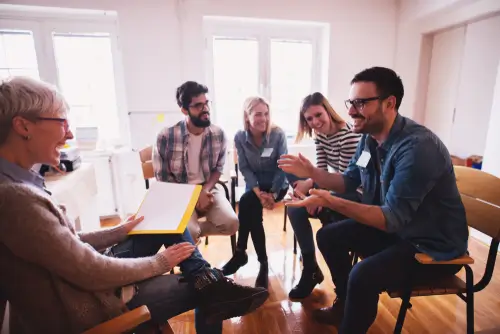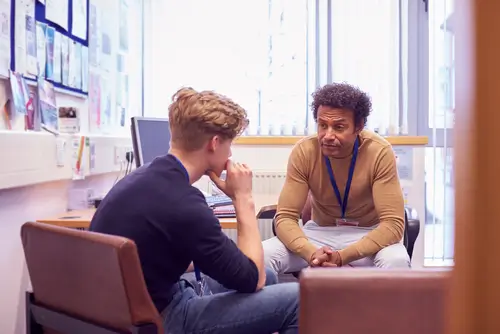The question of whether one would like to improve their mental health is undoubtedly an important one. It is rare to find individuals who would answer “no” to this question, as there is always something to work on when developing and improving one’s mental health. Mental health skill building provides a framework for individuals to develop a range of functional skills that promote mental wellness, independence, and community integration to improve mental health.
In this article, we will cover what mental health skill building is, the goal of those skills, practicing the skills, and specific activities in mental health skill building.

What is Mental Health Skill Building?
Mental health skill building (MHSS) is a type of mental health service that is designed to help individuals with mental health conditions develop the skills they need to achieve and maintain community stability and independence in the least restrictive environment possible. These services are provided by mental health professionals who work with individuals to identify their specific needs and make personalized plans of care.
The Goal of Mental Health Skill Building
The primary goal of MHSS is to provide individuals with the training and support to restore their mental health to the highest functional level possible. By providing these services, individuals can improve their mental health and well-being while achieving their goals of independence.
MHSS addresses many different areas of life through face-to-face activities, instruction, interventions, and training. Some specific areas that are addressed include:
- Functional skills and behavior related to the individual’s health, safety, hygiene, nutrition, and exercise.
- Essential activities of daily life such as budgeting, using transportation, and performing chores.
- The use of community resources as well as accessing healthcare services, social services, and recreational services.
- Medication management which includes understanding the medication side effects and addressing medication-related issues.
- Monitoring mental and physical health conditions that include nutrition, personal hygiene, and the activities of daily living.
Practicing Skill Building
While it may seem like these skills are only for medical service providers, they are also essential to incorporate into your daily life. Learning new skills to help improve your mental health gives you the tools to tackle new situations that may arise. There are many skills and activities one can do to improve their mental health.

Activities for Mental Health Skill Building
Participating in interactive and impactful activities that cater to your overall well-being can help you build resilience and coping skills, which can be especially valuable in times of crisis. While these activities can benefit many people, it’s important to understand that they may not be as beneficial for those with more serious mental illnesses. In those cases, it would be appropriate to seek help from a medical professional. Some of the activities you can participate in to improve your mental health are:
- Exercise: Exercise has been shown to have a significant positive impact on depression, anxiety, and ADHD. Not only does it reduce symptoms of these mental health conditions, but it also relieves stress, improves memory, enhances sleep quality, and boosts overall mood.
- Nutrition: The importance of nutrition goes far beyond just providing energy, supporting growth, and maintaining overall health. The field of nutrition encompasses various factors, such as food accessibility and affordability, cultural differences in dietary choices, and the reasons behind one’s food preferences.
- Relaxation: Engaging in relaxation activities offers numerous mental and physical health benefits, and the techniques can be practiced in various settings, making it a crucial aspect of self-care. Examples include taking a walk, listening to music, confiding in a friend, engaging in creative activities, reading a book, or taking a hot bath.
- Eliminating Bad Habits: By recognizing and replacing bad habits with positive ones, individuals can work towards cultivating healthier habits. This includes actively avoiding these bad habits and developing new, healthy habits.
- Self-Reflection: Developing self-reflection skills is essential for personal growth and self-improvement. Some general strategies that can help you in self-reflection include seeing a therapist, taking a class, or meditation.
- Attention-Building Games: Attention-building games are designed to improve mental focus and cognitive function. Some examples of these games include ‘Simon Says,’ ‘Red Light, Green Light,’ and ‘Sudoku.’
- Silver Lining Activities: This activity involves creating a drawing or painting that represents the positive outcomes of their lives’ dark moments. This reinforces the saying “every cloud has a silver lining” and teaches individuals that good can always come from bad situations.
- Anger Management: By utilizing anger management exercises, individuals are able to control their emotions and handle situations without anger. For example, this may involve using deep breathing techniques to calm themselves down or redirecting the emotion in a positive way, typically through exercise.
- Inner Child Activities: Inner child activities include indulging in everything you wanted to do as a child but maybe weren’t able to. This can be taking yourself to an amusement park, acting silly, or eating junk food. These activities can help you reconnect with your playful side and boost your overall happiness and well-being.
- Pet Therapy: Pet therapy involves interaction between an individual, an animal, and the animal’s handler. This is aimed at helping people overcome mental health issues by providing comfort. While dogs and cats are the most common animals, fish, horses, guinea pigs, and other animals can also be used depending on the person’s needs.
- Guided Imagery: Guided imagery can help individuals visualize their positive experiences and can serve as a relaxation technique. Individuals will close their eyes and imagine themselves in a different setting, then be asked to describe the sights, sounds, and other sensations they feel wherever they are.
Mental Health Services in Los Angeles
At Launch Centers, located in Los Angeles, we proudly offer holistic mental health treatment services to those struggling with their mental well-being. Our programs are evidence-based, individualized, and trauma-informed to give our clients the best support and resources. Launch Centers is dedicated to helping others recover from mental illness and substance abuse so that they can live purposeful lives.
If you or a loved one are suffering from mental health conditions and would like to get help now, contact us today to learn more about our programs. We understand how difficult it can be, so let us guide you to a successful life.





